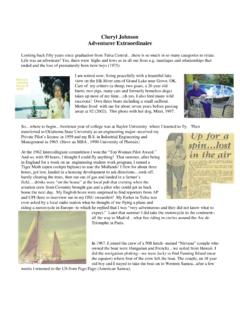Transcription of Why Arabs Lose Wars - Nav Log
1 Why Arabs lose wars by Norvell B. De Atkine Middle East Quarterly December 1999. hungarian version of this item Norvell De Atkine, a Army retired colonel with eight years residence in Lebanon, Jordan, and Egypt, and a graduate degree in arab studies from the American University of Beirut, is currently instructing Army personnel assigned to Middle Eastern areas. The opinions expressed here are strictly his own. Arabic-speaking armies have been generally ineffective in the modern era. Egyptian regular forces did poorly against Yemeni irregulars in the Syrians could only impose their will in Lebanon during the mid-1970s by the use of overwhelming weaponry and Iraqis showed ineptness against an Iranian military ripped apart by revolutionary turmoil in the 1980s and could not win a three-decades-long war against the The arab military performance on both sides of the 1990 Kuwait war was And the Arabs have done poorly in nearly all the military confrontations with Israel.
2 Why this unimpressive record? There are many factors economic, ideological, technical but perhaps the most important has to do with culture and certain societal attributes which inhibit Arabs from producing an effective military force. It is a truism of military life that an army fights as it trains, and so I draw on my many years of firsthand observation of Arabs in training to draw conclusions about the ways in which they go into combat. The following impressions derive from personal experience with arab military establishments in the capacity of military attach and security assistance officer, observer officer with the British-officer Trucial Oman Scouts (the security force in the emirates prior to the establishment of the United arab Emirates), as well as some thirty year's study of the Middle East. False Starts Including culture in strategic assessments has a poor legacy, for it has often been spun from an ugly brew of ignorance, wishful thinking, and mythology.
3 Thus, the army in the 1930s evaluated the Japanese national character as lacking originality and drew the unwarranted conclusion that the country would be permanently disadvantaged in Hitler dismissed the United States as a mongrel society6 and consequently underestimated the impact of America's entry into the war. As these examples suggest, when culture is considered in calculating the relative strengths and weaknesses of opposing forces, it tends to lead to wild distortions, especially when it is a matter of understanding why states unprepared for war enter into combat flushed with confidence. The temptation is to impute cultural attributes to the enemy state that negate its superior numbers or weaponry. Or the opposite: to view the potential enemy through the prism of one's own cultural norms. American strategists assumed that the pain threshold of the North Vietnamese approximated their own and that the air bombardment of the North would bring it to its Three days of aerial attacks were thought to be all the Serbs could withstand; in fact, seventy-eight days were needed.
4 It is particularly dangerous to make facile assumptions about abilities in warfare based on past performance, for societies evolve and so does the military subculture with it. The dismal French performance in the 1870 Franco-Prussian war led the German high command to an overly optimistic assessment prior to World War The tenacity and courage of French soldiers in World War I led everyone from Winston Churchill to the German high command vastly to overestimate the French army's fighting Israeli generals underestimated the Egyptian army of 1973 based on Egypt's hapless performance in the 1967 Culture is difficult to pin down. It is not synonymous with an individual's race nor ethnic identity. The history of warfare makes a mockery of attempts to assign rigid cultural attributes to individuals as the military histories of the Ottoman and Roman empires illustrate. In both cases it was training, discipline, esprit, and lan which made the difference, not the individual soldiers' The highly disciplined, effective Roman legions, for example, were recruited from throughout the Roman empire, and the elite Ottoman Janissaries (slave soldiers) were Christians forcibly recruited as boys from the Balkans.
5 The Role of Culture These problems notwithstanding, culture does need to be taken into account. Indeed, awareness of prior mistakes should make it possible to assess the role of cultural factors in warfare. John Keegan, the eminent historian of warfare, argues that culture is a prime determinant of the nature of warfare. In contrast to the usual manner of European warfare which he terms "face to face," Keegan depicts the early arab armies in the Islamic era as masters of evasion, delay, and Examining arab warfare in this century leads to the conclusion that Arabs remain more successful in insurgent, or political warfare13 what T. E. Lawrence termed "winning wars without battles."14 Even the much-lauded Egyptian crossing of the Suez in 1973 at its core entailed a masterful deception plan. It may well be that these seemingly permanent attributes result from a culture that engenders subtlety, indirection, and dissimulation in personal Along these lines, Kenneth Pollack concludes his exhaustive study of arab military effectiveness by noting that "certain patterns of behavior fostered by the dominant arab culture were the most important factors contributing to the limited military effectiveness of arab armies and air forces from 1945 to 1991.
6 "16 These attributes included over- centralization, discouraging initiative, lack of flexibility, manipulation of information, and the discouragement of leadership at the junior officer level. The barrage of criticism leveled at Samuel Huntington's notion of a "clash of civilizations"17 in no way lessens the vital point he made that however much the grouping of peoples by religion and culture rather than political or economic divisions offends academics who propound a world defined by class, race, and gender, it is a reality, one not diminished by modern communications. But how does one integrate the study of culture into military training? At present, it has hardly any role. Paul M. Belbutowski, a scholar and former member of the Delta Force, succinctly stated a deficiency in our own military education system: "Culture, comprised of all that is vague and intangible, is not generally integrated into strategic planning except at the most superficial level.
7 "18 And yet it is precisely "all that is vague and intangible" which defines low-intensity conflicts. The Vietnamese communists did not fight the war the United States had trained for, nor did the Chechens and Afghans fight the war the Russians prepared for. This entails far more than simply retooling weaponry and retraining soldiers. It requires an understanding of the enemy's cultural mythology, history, attitude toward time, etc.. demanding a more substantial investment in time and money than a bureaucratic organization is likely to authorize. Mindful of walking through a minefield of past errors and present cultural sensibilities, I offer some assessments of the role of culture in the military training of Arabic-speaking officers. I. confine myself principally to training for two reasons. First, I observed much training but only one combat campaign (the Jordanian Army against the Palestine Liberation Organization in 1970).
8 Secondly, armies fight as they train. Troops are conditioned by peacetime habits, policies, and procedures; they do not undergo a sudden metamorphosis that transforms civilians in uniform into warriors. General George Patton was fond of relating the story about Julius Caesar, who "In the winter time .. so trained his legions in all that became soldiers and so habituated them to the proper performance of their duties, that when in the spring he committed them to battle against the Gauls, it was not necessary to give them orders, for they knew what to do and how to do it."19. Information as Power In every society information is a means of making a living or wielding power, but Arabs husband information and hold it especially tightly. trainers have often been surprised over the years by the fact that information provided to key personnel does not get much further than them. Having learned to perform some complicated procedure, an arab technician knows that he is invaluable so long as he is the only one in a unit to have that knowledge.
9 Once he dispenses it to others he no longer is the only font of knowledge and his power dissipates. This explains the commonplace hoarding of manuals, books, training pamphlets, and other training or logistics literature. On one occasion, an American mobile training team working with armor in Egypt at long last received the operators' manuals that had laboriously been translated into Arabic. The American trainers took the newly-minted manuals straight to the tank park and distributed them to the tank crews. Right behind them, the company commander, a graduate of the armor school at Fort Knox and specialized courses at the Aberdeen Proving Grounds ordnance school, collected the manuals from the crews. Questioned why he did this, the commander said that there was no point in giving them to the drivers because enlisted men could not read. In point of fact, he did not want enlisted men to have an independent source of knowledge.
10 Being the only person who can explain the fire control instrumentation or boresight artillery weapons brings prestige and attention. In military terms this means that very little cross-training is accomplished and that, for instance in a tank crew, the gunners, loaders, and drivers might be proficient in their jobs but are not prepared to fill in for a casualty. Not understanding one another's jobs also inhibits a smoothly functioning crew. At a higher level it means there is no depth in technical proficiency. Education Problems Training tends to be unimaginative, cut and dried, and not challenging. Because the arab educational system is predicated on rote memorization, officers have a phenomenal ability to commit vast amounts of knowledge to memory. The learning system tends to consist of on- high lectures, with students taking voluminous notes and being examined on what they were told.

